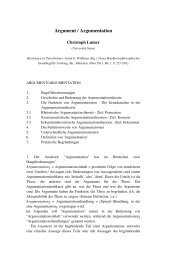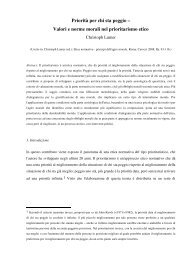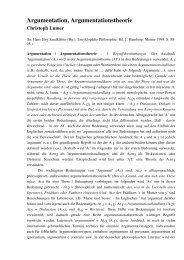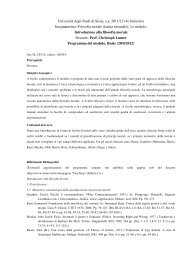What is Practical Knowledge? - Prof. Dr. Christoph Lumer
What is Practical Knowledge? - Prof. Dr. Christoph Lumer
What is Practical Knowledge? - Prof. Dr. Christoph Lumer
Create successful ePaper yourself
Turn your PDF publications into a flip-book with our unique Google optimized e-Paper software.
<strong>Lumer</strong>: <strong>What</strong> Is <strong>Practical</strong> <strong>Knowledge</strong>? 6aim <strong>is</strong> only to show that the objections can be quashed and do not point to real problems; inaddition, the spirit and sense of the theory and of its details shall be made clearer by responding tothe objections.A first objection says that effective internal<strong>is</strong>m does not leave sufficient room for the normativity ofmorals; morals must be able to condemn morally wrong actions. If effective internal<strong>is</strong>m were truenobody could act immorally because if the agent <strong>is</strong> not motivated to act morally, according toeffective internal<strong>is</strong>m, the moral demand would van<strong>is</strong>h as well. The reply to th<strong>is</strong> objection <strong>is</strong> simple:Th<strong>is</strong>, clearly, <strong>is</strong> not what effective internal<strong>is</strong>m says or implies. According to the rather weak formof effective internal<strong>is</strong>m proposed above, there are several possibilities that may go wrong ifsomeone <strong>is</strong> not motivated to act morally, and which however must be excluded before the moraldemand has to be d<strong>is</strong>carded as being against the requirements of effective internal<strong>is</strong>m. (i) The agentmay simply not believe that her action <strong>is</strong> morally wrong; (ii) she may be motivated but have other,overriding reasons; (iii) the other ep<strong>is</strong>temic preconditions for the motivating effect of the convictionmay not be fulfilled.A second, more targeted objection says that morality cannot consider everybody's motivation,otherw<strong>is</strong>e morals would be too weak, and perhaps could even van<strong>is</strong>h completely. Ultimately, th<strong>is</strong> <strong>is</strong>only a weaker form of the first objection; therefore the reply <strong>is</strong> similar to the first rejoinder.Considering the many possibilities which have to be excluded before a moral demand would haveto be d<strong>is</strong>carded for not fulfilling the conditions of effective internal<strong>is</strong>m, there seems to be ampleroom for rather strong moral demands.A third, more radical critic<strong>is</strong>m says that the aim of ethics <strong>is</strong> to justify moral judgements and criteriafor such judgements; questions of motivation instead are the task of educators, psycholog<strong>is</strong>ts andpoliticians. Th<strong>is</strong> objection can be interpreted as a critic<strong>is</strong>m of foundational internal<strong>is</strong>m only, buthere it shall be taken as a much more radical objection, i.e. a rejection of effective internal<strong>is</strong>m.However, in th<strong>is</strong> case the objection begs the question. Effective internal<strong>is</strong>m by no means excludesthat ethics, among other tasks, tries to justify criteria for moral judgements, it only establ<strong>is</strong>hesmotivational constraints for the resulting criteria. To say that the ethic<strong>is</strong>t does not need to do so, assuch, <strong>is</strong> not an argument but only an unjustified counter-claim, against which the three reasonsgiven above stand. A stronger rejoinder <strong>is</strong> to concede that ethics, of course, has to justify moraljudgements but that th<strong>is</strong> has to be functional for guiding and evoking moral action (cf. e.g.Ar<strong>is</strong>totle, E.N. 1094a, 22-24; 1095a, 2-6).3. Questionable Conceptions of <strong>Practical</strong> <strong>Knowledge</strong> -- The Problem of theEmpirical Bas<strong>is</strong> of Motivational ForceI now want to d<strong>is</strong>cuss some conceptions of practical knowledge that at least implicitly accept thepractical requirement and thus effective internal<strong>is</strong>m, which however, according to the followinganalyses, do not fully realize the implications of th<strong>is</strong> requirement. Again, d<strong>is</strong>cussing these theories





![Vorwort [Biographie und Laudatio Wolfgang Lenzen]](https://img.yumpu.com/40262871/1/184x260/vorwort-biographie-und-laudatio-wolfgang-lenzen.jpg?quality=85)

